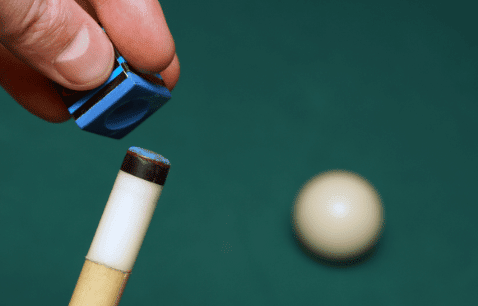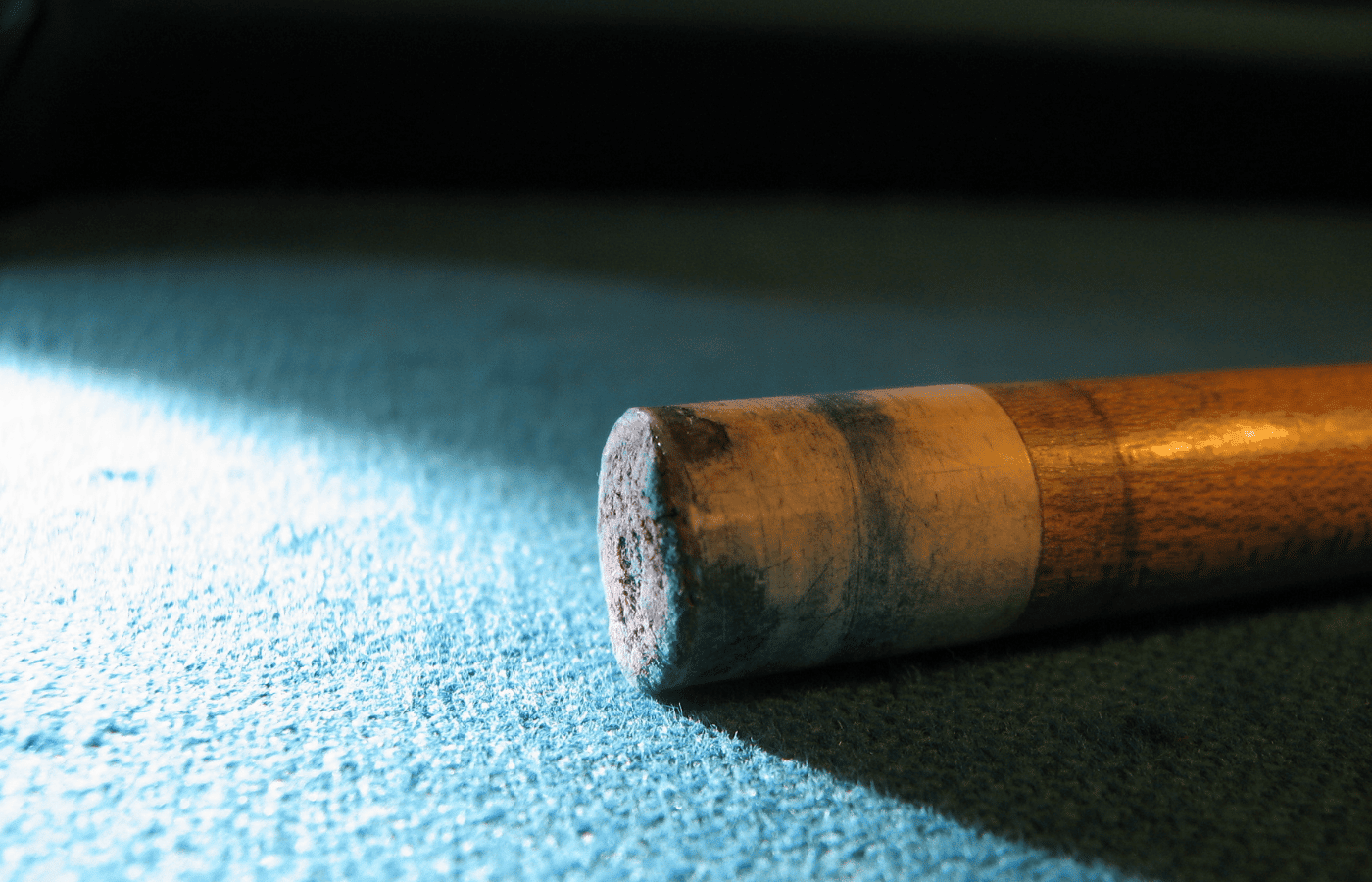Removing chalk marks from a pool cue is easy if you have the right tools. Use a damp cloth, rubbing alcohol or a “magic eraser” to remove the dirt and then reseal it using wax, oil, or leather.
Keeping your pool cue in good working order is a good idea. Because it comes into contact with your hands so frequently it can very quickly become dirty and covered in grime. This is because the natural oils from your hands and the chalk can build up over time.
So, here we will tell you everything that you need to know about keeping your pool cue clean from the frequency that you clean it to the need to chalk your cue often.
How Do You Clean Chalk off of a Pool Stick?
When it comes to keeping your pool stick clean there are several home methods out there. However, one thing that you should keep in mind is how aggressive the process is for the oils on your pool cue’s shaft. The last thing that you will want to do is ruin your pool stick in the process of cleaning it.
If you aren’t careful then you can easily end up getting chalk everywhere, both on you and your pool stick. However, it is not as easy to clean as you may first think. It cannot simply be washed off. Instead, there are different methods of cleaning chalk off of different surfaces. So, how do you clean chalk off a pool stick?
Rubbing Alcohol
Rubbing alcohol is one of the best solutions for cleaning unwanted and old chalk off a pool stick. However, you should use it sparingly by rubbing or spraying it onto a soft cloth and lightly rubbing it over the chalk.
Once you have successfully removed the chalk from the pool stick you will want to reseal the stick, this will help to protect the oils.
Beeswax Wood Polish
There Are Several Ways to Do This, but One of the Most Effective Is to Use a Beeswax Wood Polish. You Will Need to Gently Buff This Into the Wood on Your Pool Stick Post-Cleaning. This Will Then Protect Your Pool Stick From Exposure to Moisture and Damage.
To check the current price and availability of Beeswax Wood Polish, click here to view the listing on Amazon.
How Do I Keep My Pool Cue Shaft Clean?
One of the best things that you can do to keep your pool oy shaft clean is to maintain it regularly. Just like anything that gets dirty from use the more often you clean it the easier it will be to remove any stains, grime or dirt.
Think of it the same way that you would spilling red wine on a white shirt – the quicker you clean up the mess the better. The longer you leave the mess the harder the stain can be to remove.
It is the same with your pool cue. It will gradually build up grime over time simply from touching surfaces, from the chalk and even from the natural oils in your hands. So, naturally, the more you use the pool cue, the more you should clean it.
One of the easiest things that you can do to maintain your pool cue is to have a soft cloth always on hand. You can quickly and easily rub it down of any dirt or chalk dust during a game, or even make a habit of it after every game. The more regularly you give it a quick clean (with no abrasive solutions of course) the better it will keep.
Magic Eraser
If you find that you have neglected cleaning your pool cue for a long time then you may notice a serious build-up of grime on the shaft. This is not ideal. In this case, you may find that a damp cloth, or even rubbing alcohol, does not get the job done. Instead, there is a product called a “magic eraser”. You should use this sparingly as it is very effective.
This will be able to remove any excess grime from the shaft. There are other methods used by players, such as lightly using sandpaper over stubborn or hard-to-clean areas as well as rubbing an old dollar bill over the area to reseal it. However, this is using heat as the resealing agent and can lead to problems. Instead, you should opt for a piece of leather to brandish using heat.
After cleaning your pool cue shaft with the magic eraser, or another method of your choice, rub back and forward over the area with the piece of leather. This removes the need for wax or oils to reseal your cue.
To check the current price and availability of Mr. Clean Magic Eraser, click here to view it on Amazon.
How Often Should You Chalk Your Cue?

There is no set amount that you should chalk your cue. In fact, this frequency will often range from player to player. So, depending on who you ask you will get different answers.
However, as a rule of thumb think of chalking your cue roughly every other turn, if not after every turn. Of course, the type of shot that you are going to take will affect whether or not you will need to chalk your cue.
For example, if you are going to be taking a shot that needs a lot of extra spin on the ball then you are definitely going to need to chalk your cue to give you the extra friction required.
Of course, this is also true of the reverse. If you want to achieve minimum spin on the ball then you will not want to excessively chalk your cue as this can have negative effects on your shot.
So, overall it is advantageous to regularly chalk your cue. However, you should be both careful and considerate when doing so as the dust from the chalk can very quickly get everywhere. Avoid chalking your cue over the table and also be wary of your clothes.
If you do indeed manage to get chalk everywhere then use a damp cloth to gently pat and rub your clothes as well as your pool stick. If your cue requires further cleaning follow the game then follow the advice explained above.
Final Thoughts
Keeping your pool cue clean can be a tricky job, especially because it comes into contact with so many things. Naturally, the dust from the chalk will go everywhere because it is light enough to remain in the air before landing on your clothes and stick. This is in addition to oils and anything else that may come into contact with your pool cue.
So, it is best to clean your pool cue often to avoid any grime or dirt building up. Not only will this not be very nice to hold, but it is unhygienic and may potentially affect your shot via your grip on the cue. So, make sure that you remove any dirt as needed (this will depend on how often you play) using the steps detailed above.
You should not avoid chalking your cue in a bid to reduce cleaning as this can have a negative effect on your shot. Instead, aim to chalk your cue after every turn, using more or less chalk depending on how much friction you will need for a certain shot. Shots requiring more friction will also require more chalk.



